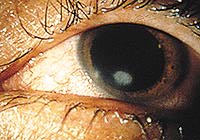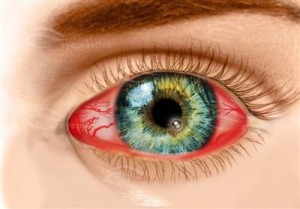Conjunctivitis (Pink Eye)
- What is conjunctivitis?
- Commonly known as Pink Eye, conjunctivitis is an infection of the conjunctiva (the inside lining of the eyelid and outside skin on the eyeball). It can be caused by bacteria, virus or allergies (see the Allergy section).
- Signs and symptoms:
- Red, irritated, watery eyes with a burning and scratchy feeling.
- There may be pus, ropey mucus or watery discharge.
- Preventing the spread of the infection:
- Pink Eye spreads very easily, especially the viral variety. Wash hands frequently.Wash any clothes, towels, pillow cases touched by the infected eye in hot water. Avoid sharing cosmetics, cooking utensils, towels or bed linens. Do not rub your eyes!
- Treatment:
- See Dr. Vale at InterMountain Eye Associates to treat the pinkeye or call us for advice on helpful treatments and medication.
- Ice packs and preservative free artificial tears are often helpful in relieving discomfort.
- Usually an antibiotic will be selected by your eye doctor if the infection is bacterial. Some viral forms of pinkeye are amenable to treatment with anti-viral medication, others are not.
Bacterial Keratitis (Corneal Ulcer)
- What is bacterial Keratitis (Corneal ulcer)?
- A corneal ulcer is an infection of the cornea by bacteria, viruses or fungi. Two of the common causes are: Abrasion of the cornea with foreign bodies and poor hygiene of contact lenses (especially if worn overnight).
- Signs and symptoms
- Eye pain, redness, itching and burning, white patch on the cornea, increased tearing, sensitivity to light (photophobia).
- Preventing the spread of the infection
- Early attention by an ophthalmologist or optometrist to any eye infection may prevent the ulceration and further injury to the cornea. An untreated corneal ulcer can permanently damage the cornea. It may also perforate the eye, resulting in a spread of infection, increasing the risk of permanent visual impairment.
- Treatment
- See Dr. Vale immediately. Corneal ulcers can lead to blindness if not treated promptly and aggressively.
- Usually an antibiotic will be selected by your InterMountain eye care specialist if the ulcer is bacterial. Cultures may need to be obtained before empiric treatment is started.
- Occasionally, mild pain medication is prescribed as well.
OUR LOCATIONS:
78 Salem Avenue
Carbondale, PA 18407
PHONE: (570) 282-2000 • FAX: (570) 483-8210
4 Meadow Avenue
Scranton, PA 18505-2337
PHONE: (570) 504-1530 • FAX: (570) 504-1533
216 Nazareth Pike
Bethlehem, PA 18020
PHONE: (610) 813-0342 • FAX: (610) 813-0628



 Note the whitish appearance of the bacterial ulcer and the general redness of the rest of the eye.
Note the whitish appearance of the bacterial ulcer and the general redness of the rest of the eye.
Comments are closed